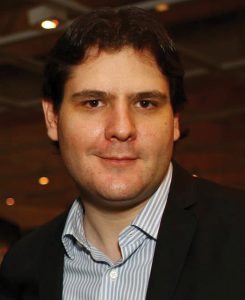By Vicki Matranga, Design Programs Coordinator
Wednesday, June 18, 2014

Paulo Krugelsky, CEO of Etna, outlined the Brazilian retailer’s position in its market region. Based in Sao Paulo, Etna has grown rapidly in ten years and now operates 18 outlets in the major cities of 12 Brazilian states. Brazil’s long-term fundamentals are strong and its political and economic stability in Latin America have resulted in steady growth during the recent decade and contribute to positive forecasts for the country’s future. Forecasts predict that by 2030 Brazil will be the 8th largest world economy. Brazil’s middle class is growing at 4% per year.
Inspired One-Stop Shopping
Etna pioneered a new one-stop shopping concept in Brazilian home furnishings retailing. Consumers feel they have stepped into a place where they can find everything for the home. Attractive environments inspire and delight shoppers as home furnishings, décor products and housewares are displayed in comfortable room settings that suggest decorating ideas. Etna stores don’t sell plastics or furniture—they sell solutions on how to furnish a room.
The innovative environments are created by Etna’s staff architects as well as by invited notable designers. Displays include carpeting and curtains, lighting, furniture, décor, home organization and kitchen and bath items to reflect trending fashions. Etna offers high design products at affordable prices to enhance everyday life. The larger stores include children’s playrooms and restaurants for family shopping. On a weekend, a store might serve 6,000 people.
With six stores in Sao Paolo, a city of 30 million residents, and its other locations, Etna reaches 83% of potential customers with its storefront shops and mall stores; the remaining 17% of the market can shop online. Etna carries 20,000 SKUs: housewares products (kitchenware, tableware and home organization) comprise 5000 SKUs or 25% of sales. Etna employs 2,300 workers. Etna aims to be the biggest and the best furniture and decoration company in Latin America.
Etna owns its furniture factory that produces staff designs in order to keep their assortments on trend. Its furniture is made of the best Brazilian woods, stainless steel and acrylic. Ethnic furniture is imported from countries such as India, China, Morocco, and Indonesia, among others. Unlike IKEA which requires customers to build furniture themselves, Etna delivers and installs furniture. Etna makes 3,500 client deliveries per day.
Market Position and International Brands
On the spectrum from basic commodity stores to expensive stores carrying exclusive products, Etna is positioned in the middle range with its high design and affordable quality. Its television and print advertising, as well as social media presence, present an exciting and stylish brand image. Etna’s assortment has an annual 30% turnover to keep on trend and be fast, fresh and fashionable in colors and styles. They look for international trends. Familiar design brands include Casabella, Interdesign, Full Circle, Gibson Overseas, Joseph Joseph, Kikkerland, Lekue OXO, Progressive, Trudeau, Umbra, simple human and Zak. They invest in product collections for a full representation of a brand.
Brazilians travel more than ever and brands are important to them. They often travel to the U.S., love the U.S. lifestyle and know U.S. prices. They can search for products online and compare prices and so Etna must be sensitive to how it positions its products and brands. An item sold in Brazil must relate to its market position in other countries.
Etna’s strategy for growth relies upon
- Long term partnerships with international suppliers
- Continued market differentiation
- The correct retail place, price and position
- Building international brands in Brazil
Mr. Krugelsky outlined Etna’s business model that deals directly with suppliers. Because of 82% taxes in Brazil, a product sold in the U.S. will be twice the price in Brazil. If purchasing through distributors, the Brazil price could be 4x the U.S. price. Audience questions following his presentation centered on this issue. He explained that the 82% is comprised of import duties, VAT, port taxes, and sales taxes. In the U.S., a 5-10% sales tax is added onto the sale price. Brazil sales taxes vary by province, but are included in the final price to consumers. In order to stay competitive, Etna offers installment payments, so that a customer can choose at the register to pay over several months. There is no difference on price for cash or installment payments; government regulations prohibit discounts for cash or upcharges for installments. About 50% of Etna’s sales are such “split” time payments, which causes cash flow problems. In order to stay competitive for global brands, Etna tries to deal directly with marketers and must have full assortments instead of single pieces in a branded line. Its offerings now are about 80% private label and they aim for 50/50 branded vs. private label products, because of the pressures of developing private label products.
Paulo Krugelsky, CEO of Etna, studied business administration at Fundação Armando Alvares Penteado and completed additional business education at Boston University. After his graduation he worked at Alpargatas, a publicly held Brazilian footwear company and then moved to Banco Itaú. In 2007 he joined Etna to manage purchasing, followed by positions in logistics and operations.
To learn more about Etna, visit



